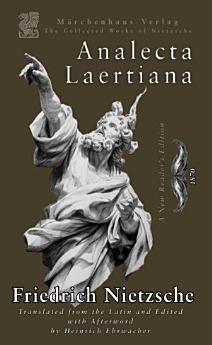Analecta Laertiana: A New Reader's Edition
May 2024 · The Collected Works of Friedrich Nietzsche Book 10 · Marchen Press
Ebook
115
Pages
family_home
Eligible
info
reportRatings and reviews aren’t verified Learn More
About this ebook
Written in Latin with many Greek quotations, Nietzsche's "Analecta Laertiana" is a commentary that Friedrich Nietzsche made on the work "Lives and Opinions of Eminent Philosophers" by Diogenes Laërtius, a Greek philosophical historian. This ancient text is an important source of biographical information about Greek philosophers, and Nietzsche's notes on it are part of his broader philological and philosophical studies. These notes and comments, known collectively as the "Analecta Laertiana," consist of Nietzsche's critical comments, interpretations and elaborations on the various philosophers and philosophies discussed in Diogenes Laertius' work and their origins. Nietzsche analyzes the textual variations and historical contexts in order to provide a more nuanced understanding of Diogenes Laertius' contributions to the historiography of philosophy. This was one of many works on ancient Greek sources that Nietzsche published as a philologist and professor at the University of Basel. The "Analecta Laertiana" was not published during Nietzsche's lifetime, but was part of his extensive legacy of notes, lectures, and unpublished manuscripts that were published by his sister's foundation after his death. As such, this work is meandering and not logically organized, as Nietzsche never compiled them for publication. This work was first published after Nietzsche's death in the volume "Gesammelte Werke" edited by Peter Gast (a pseudonym for Heinrich Köselitz, a close associate of Nietzsche) and Elisabeth Förster-Nietzsche (Nietzsche's sister). They were included in the second series of these collected works under the title "Philologica", published in 1897. This modern translation from the original manuscript is designed to allow the armchair philosopher to engage deeply with Nietzsche's works. The language is modern and clean, with simplified sentence structures and diction to make Nietzsche's complex language and arguments as accessible as possible. This Reader's Edition also contains extra material that amplifies the manuscript with autobiographical, historical and linguistic context. The edition includes an Afterword by the Translator on the history, impact and intellectual legacy of Nietzsche in context of this work, an index of Philosophical concepts used by Nietzsche with a focus on Existentialism and Phenomenology, a complete chronological list of Nietzsche's entire body of works, and a detailed timeline of Nietzsche's life journey, including the personal relationships which greatly influenced his philosophy.
About the author
Friedrich Nietzsche (1844-1900) was a watershed German philosopher, cultural critic, poet, musician (briefly) and philologist (the study of ancient manuscripts) whose work has had a profound impact on modern intellectual history. Known for his critiques of European morality and religion (particularly Protestantism), Nietzsche's ideas on the "will to power" and the "Übermensch" have influenced a wide range of philosophical, literary, and psychological thought including thinkers such as Martin Heidegger, Albert Camus, Michael Foucault and the entire Postmodern religion.
Rate this ebook
Tell us what you think.
Reading information
Smartphones and tablets
Install the Google Play Books app for Android and iPad/iPhone. It syncs automatically with your account and allows you to read online or offline wherever you are.
Laptops and computers
You can listen to audiobooks purchased on Google Play using your computer's web browser.
eReaders and other devices
To read on e-ink devices like Kobo eReaders, you'll need to download a file and transfer it to your device. Follow the detailed Help Center instructions to transfer the files to supported eReaders.











